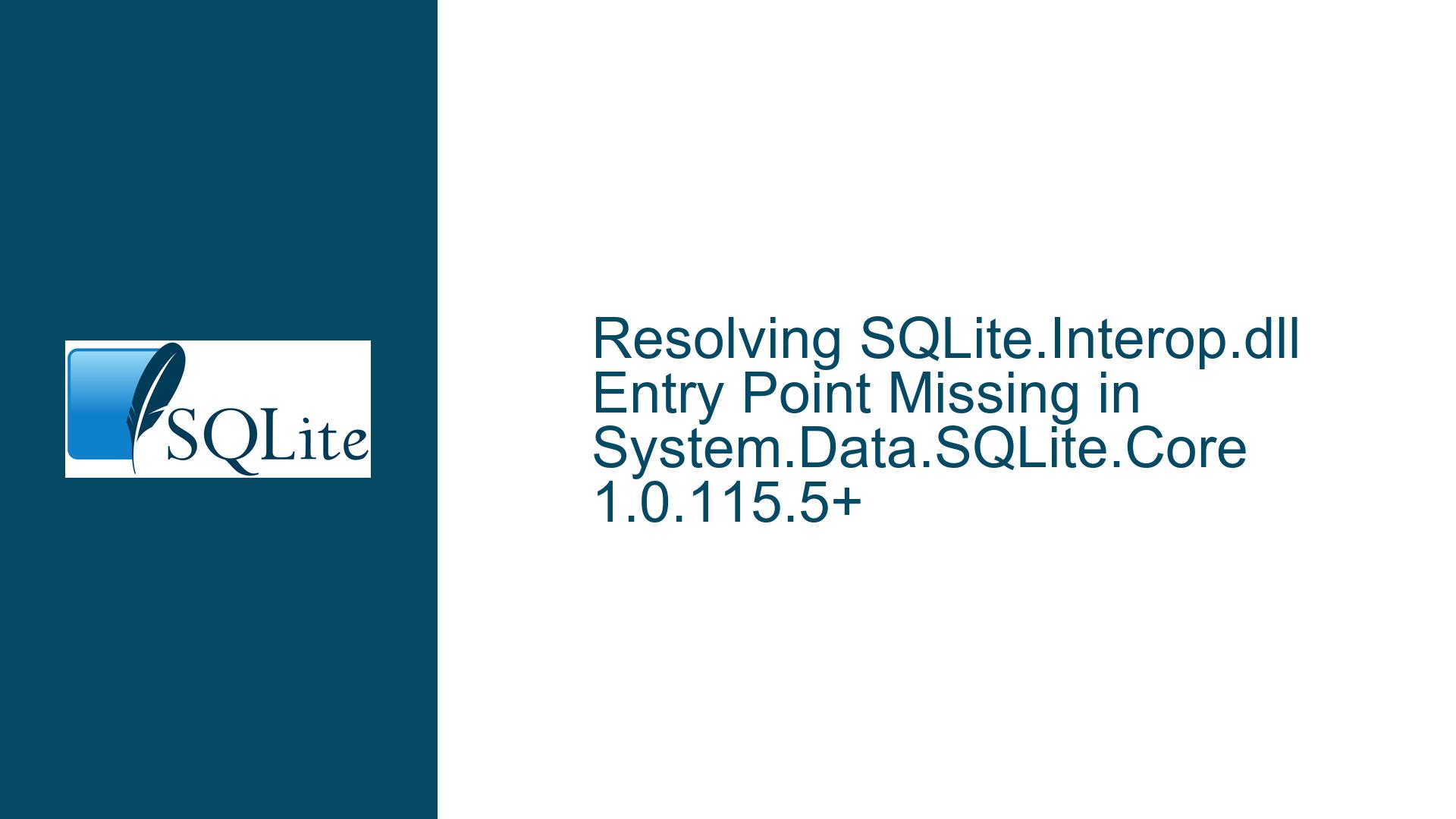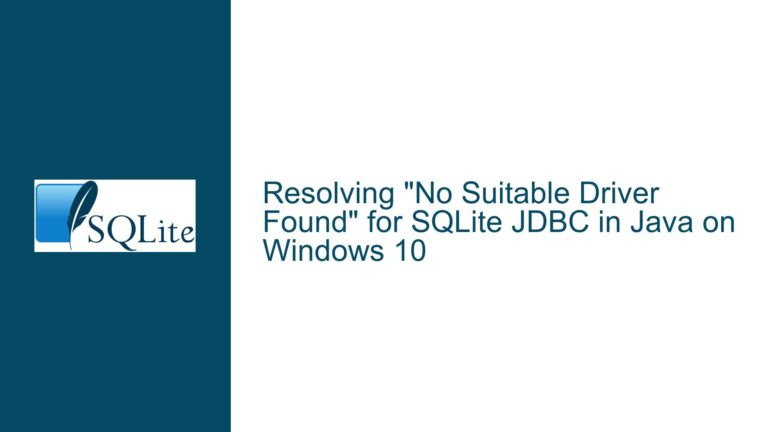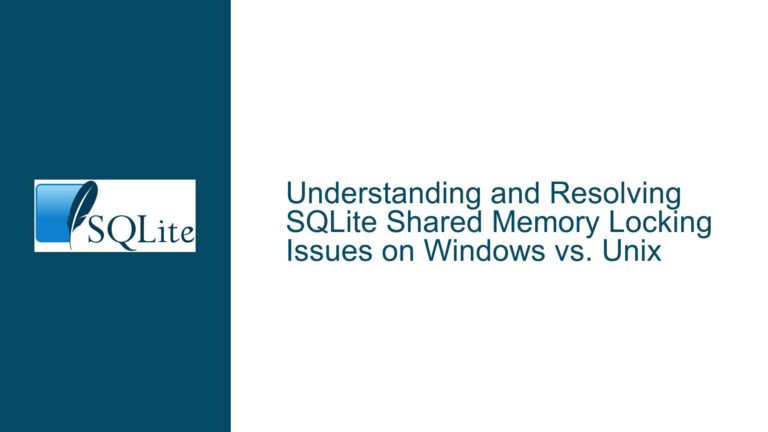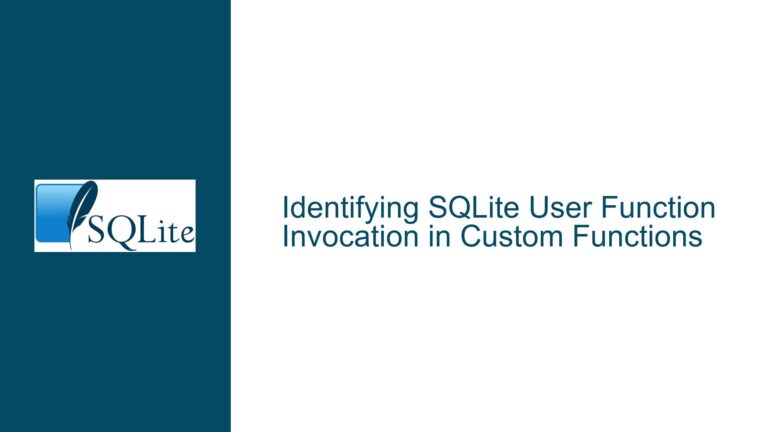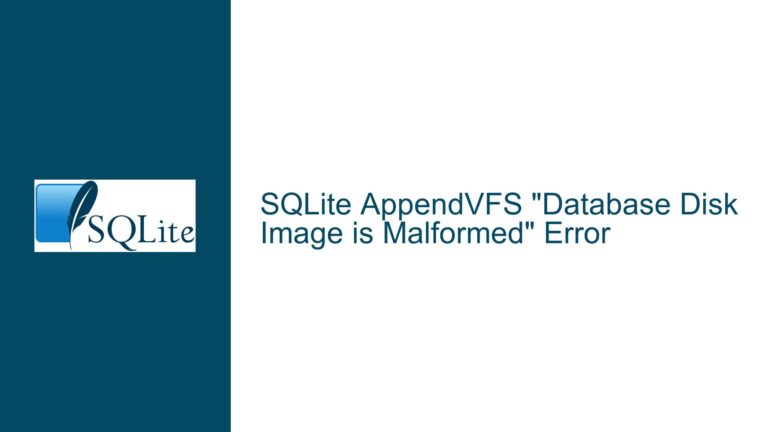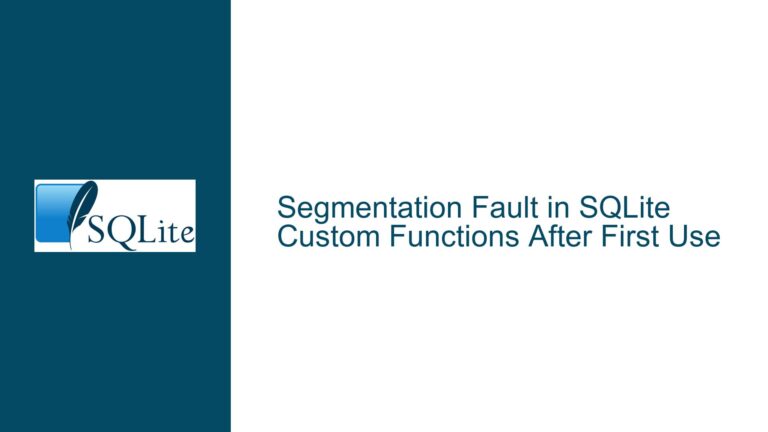Resolving SQLite.Interop.dll Entry Point Missing in System.Data.SQLite.Core 1.0.115.5+
Entry Point Mismatch in SQLite.Interop.dll with System.Data.SQLite.Core 1.0.115.5+
Issue Overview
The core problem revolves around a runtime error encountered when using System.Data.SQLite.Core 1.0.115.5 or newer versions in .NET applications. The error manifests as:
System.EntryPointNotFoundException: Unable to find an entry point named 'SIa069da76968b7553' in DLL 'SQLite.Interop.dll'
This occurs during attempts to load native SQLite functions via P/Invoke or through the managed System.Data.SQLite assembly. The error is tied to changes in how SQLite.Interop.dll exports function entry points starting with version 1.0.115.5. Prior versions (e.g., 1.0.115.0 or 1.0.114.3) work without issue.
Key Observations
- Encoded Entry Point Names: Newer versions of
SQLite.Interop.dlluse obfuscated or encoded entry point names (e.g.,SIa069da76968b7553) instead of human-readable names likesqlite3_open_interop. This breaks applications that directly reference these entry points viaDllImportattributes. - NuGet Package Dependencies: The managed
System.Data.SQLite.Coreassembly and its nativeSQLite.Interop.dllcounterpart are tightly coupled. Mixing versions (e.g., using a managed assembly from one NuGet package with an interop DLL from another) leads to incompatibility. - Platform-Specific Builds: Users compiling
SQLite.Interop.dllfrom source or distributing it across platforms (e.g., ARM64, FreeBSD) face inconsistencies due to mismatched entry point expectations.
Impact
- Applications relying on direct P/Invoke calls to SQLite’s native API (e.g., custom window functions, extensions) fail abruptly.
- Upgrading from older NuGet packages to 1.0.115.5+ introduces runtime crashes, even if the application code remains unchanged.
- Cross-platform compatibility is hindered, as prebuilt NuGet interop assemblies may not align with custom-compiled binaries.
Version Compatibility and Build Configuration Conflicts
Possible Causes
Entry Point Obfuscation in Newer Interop DLLs
Starting with 1.0.115.5, the SQLite.Interop.dll uses a new name-mangling scheme for exported functions. This change was intentional to enforce stricter coupling between the managedSystem.Data.SQLite.Coreassembly and its native counterpart. The mangled names prevent unintended direct usage of the interop DLL outside the official NuGet package ecosystem.Mismatched Managed and Native Components
The error arises when:- A project references
System.Data.SQLite.Core 1.0.115.5but uses an olderSQLite.Interop.dll(or vice versa). - Custom-compiled
SQLite.Interop.dllbinaries are used with NuGet-managed assemblies, as the source code for NuGet packages may differ from public repositories.
- A project references
Incorrect DLL Loading Paths
The .NET runtime may load an incorrectSQLite.Interop.dllfrom:- The Global Assembly Cache (GAC), which might host outdated versions.
- Anti-virus software quarantining or blocking the DLL.
- Incorrect deployment directories (e.g., missing
x86orx64subfolders for platform-specific binaries).
Incomplete or Corrupted NuGet Package Installation
NuGet might fail to restore the correctSQLite.Interop.dllfor the target platform, especially in multi-architecture projects.Legacy Code Assuming Unmangled Entry Points
Applications using hardcodedEntryPointvalues inDllImportattributes (e.g.,EntryPoint = "sqlite3_create_window_function") break because newer interop DLLs no longer export these symbols verbatim.
Correcting Entry Point Resolution and Ensuring Interop Assembly Compatibility
Troubleshooting Steps, Solutions & Fixes
1. Validate Package and Assembly Consistency
- Downgrade to a Compatible Version: If direct P/Invoke calls are unnecessary, revert to
System.Data.SQLite.Core 1.0.115.0or earlier. Confirm compatibility by modifying the project’s.csprojfile or NuGet Package Manager:<PackageReference Include="System.Data.SQLite.Core" Version="1.0.115.0" /> - Ensure NuGet Package Integrity: Clean and rebuild the solution after updating packages. Verify that the
SQLite.Interop.dllinbin\x64\orbin\x86\matches the NuGet package version.
2. Resolve DLL Loading Issues
- Side-by-Side Deployment: Ensure
SQLite.Interop.dllis deployed in platform-specific subdirectories (e.g.,\x64\,\x86\) alongside the executable. The directory structure should mirror:Application.exe \x64\ SQLite.Interop.dll \x86\ SQLite.Interop.dll - Disable Anti-Virus Temporarily: Test if security software is interfering with DLL loading. Whitelist the application directory if necessary.
- Clear the Global Assembly Cache (GAC): Use
gacutil /u System.Data.SQLiteto remove outdated entries forcing the runtime to load the local DLL.
3. Adapt Code for New Entry Point Mangling
If direct P/Invoke is unavoidable:
- Extract Entry Point Names: Use tools like
dumpbin(Windows) orobjdump(Linux) to list exported symbols fromSQLite.Interop.dll:dumpbin /exports SQLite.Interop.dllSearch for mangled names corresponding to the target function (e.g.,
sqlite3_open_interopbecomesSIfcfad09d1b0a60ecin version 1.0.115.5). - Update DllImport Attributes: Hardcode the mangled name as the
EntryPoint:[DllImport("SQLite.Interop.dll", EntryPoint = "SIfcfad09d1b0a60ec")] internal static extern SQLiteErrorCode sqlite3_open_interop(...); - Dynamic Binding via Reflection: Resolve entry points at runtime using
LoadLibraryandGetProcAddress(advanced, platform-dependent).
4. Compile from Source for Non-Standard Platforms
For FreeBSD, ARM64, or custom configurations:
- Use the Official Source Zip: Download from system.data.sqlite.org and compile with platform-specific flags.
- Override Entry Point Mangling: Modify the
NativeMethodsclass in the source to export unmangled names (not recommended; may violate licensing terms).
5. Leverage Managed APIs Instead of P/Invoke
Avoid direct native calls by using the managed SQLiteFunction class. For example, window function support can be added by subclassing SQLiteFunction and overriding Step and Final methods. Await updates from the maintainers, as enhanced window function support is planned for future releases.
6. Binding Redirects and Assembly Resolution
If downgrading causes FileLoadException due to version mismatches:
- Add Binding Redirects: In
app.config, enforce version alignment:<dependentAssembly> <assemblyIdentity name="System.Data.SQLite" publicKeyToken="db937bc2d44ff139" culture="neutral" /> <bindingRedirect oldVersion="1.0.115.5" newVersion="1.0.115.0" /> </dependentAssembly> - Handle Assembly Resolution Programmatically: Use
AppDomain.CurrentDomain.AssemblyResolveto redirect loads at runtime.
7. Monitor Official Updates and Community Forks
Track the System.Data.SQLite GitHub repository for fixes. Version 1.0.117.0 and newer aim to restore unmangled exports for critical functions. Consider community forks if official support lags.
Final Notes
The entry point mismatch stems from intentional design changes in the SQLite.Interop.dll build process, prioritizing NuGet package integrity over backward compatibility. While frustrating for legacy implementations, this underscores the importance of using managed APIs where possible and adhering to side-by-side deployment practices. For mission-critical applications locked into specific SQLite versions, maintain a frozen dependency chain and validate all updates in a staging environment.
